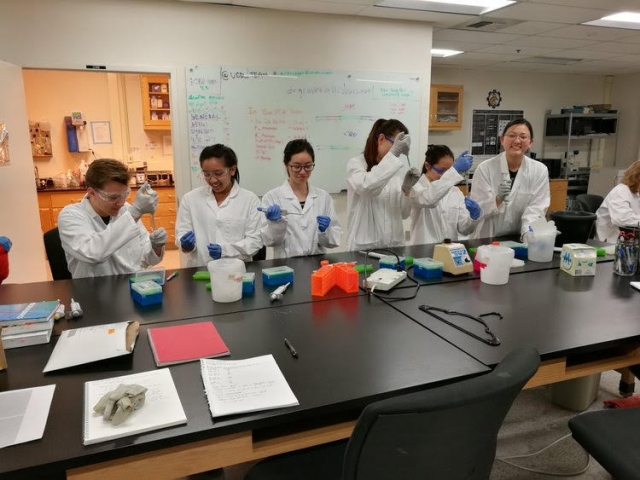
The undergraduate-run organization aims to provide all students with laboratory experience
From developing a vegan cheese to finding a lower cost alternative for assaying plant disease, BioInnovation Group offers undergraduate students a myriad of opportunities to obtain hands-on research experience.
Initially called the Synthetic Biology Club, members such as Lisa Illes, a fourth-year biosystems engineering major and current president of BIG, and Alex Krueger, a fifth year biochemical engineering major and strategy and development advisor of BIG, decided to restart the club utilizing the UC Davis Molecular Prototyping and Innovation Lab. Their decision to revitalize the club came under the advisement of Marc Facciotti, an associate professor of the biomedical engineering department and director of the TEAM labs.
“[We want to] provide a resource for undergraduate students that does not already exist because there’s a few classes that you can get lab skills, but not really [one that] teaches you how to make your project or what it takes to formulate your own idea,” said Karenna Rehorn, a third year biomedical engineering major and project coordinator of BIG. “No one really gives you the structure for that, and that’s what we’re trying to do.”
Illes said that she wanted to see opportunities for students to work in research labs and gain research experience, as she herself had trouble finding these opportunities as a freshman and sophomore. In addition, BIG gives students the chance to participate in independent research rather than working under a professor or graduate student, as the organization is entirely undergraduate-run.
“It’s really cool having undergraduates run something because, for the most part, no one thinks undergraduates are capable of much, especially in scientific terms,” said Jacob Lang, a third-year biochemistry major and vice president of BIG. “It’s just really awesome to know that we organize all this stuff, and we’re able to actually accomplish real things in science.”
BIG currently offers five research projects: looking at stress pathways in mammalian cell models, 3D printing microfluidic molds to be able to do small scale manipulations, synthesizing the four primary cheese proteins in yeast cells and utilizing a 3D bioprinter to print plant cells in gels. The organization is also currently working in conjunction with HM Clause, a seed-research company, in order to optimize a bioassay that screens plants for diseases.
In addition, BIG recently revamped their Student Lab Managers program, which according to Daniel Graves, a third-year genetics and genomics major and senior student lab manager of BIG, was sparked by the need to scale up. Graves stated that the organization found it important to have a set of students who could help run the laboratory space and train students in hands-on skills that are not commonly offered in coursework. According to Lang, in addition to serving as safety officers during laboratory hours, the student lab managers are currently developing a set of protocols to teach students laboratory skills and the background knowledge behind these skills simultaneously.
“Our Student Lab Managers program is basically built around the idea that we want to provide students on campus and every student on campus with two opportunities: the opportunity to discuss scientific papers that they read with other students and [to] provide them the opportunity to learn basic laboratory techniques that they would need in any biological laboratory they would find themselves in, be it in industry or somewhere on campus,” Illes said.
According to Graves, moving forward, the organization hopes to scale up to provide even more opportunities to a larger number of students. He stated that BIG strives to be as inclusive as possible and provide a space for anyone who wants to participate in innovating biology.
“The main goal of the group is to allow any undergraduate that wants to do research be able to come in with minimal barrier and be able to do meaningful research,” Lang said. “It’d be really awesome if [students] can come in with an idea and they have no skills, we’re able to help them gain all the skills needed and then they’re actually able to do something that came from their own mind and they’re actually able to create something out of it.”
Written by: Michelle Wong — science@theaggie.org



